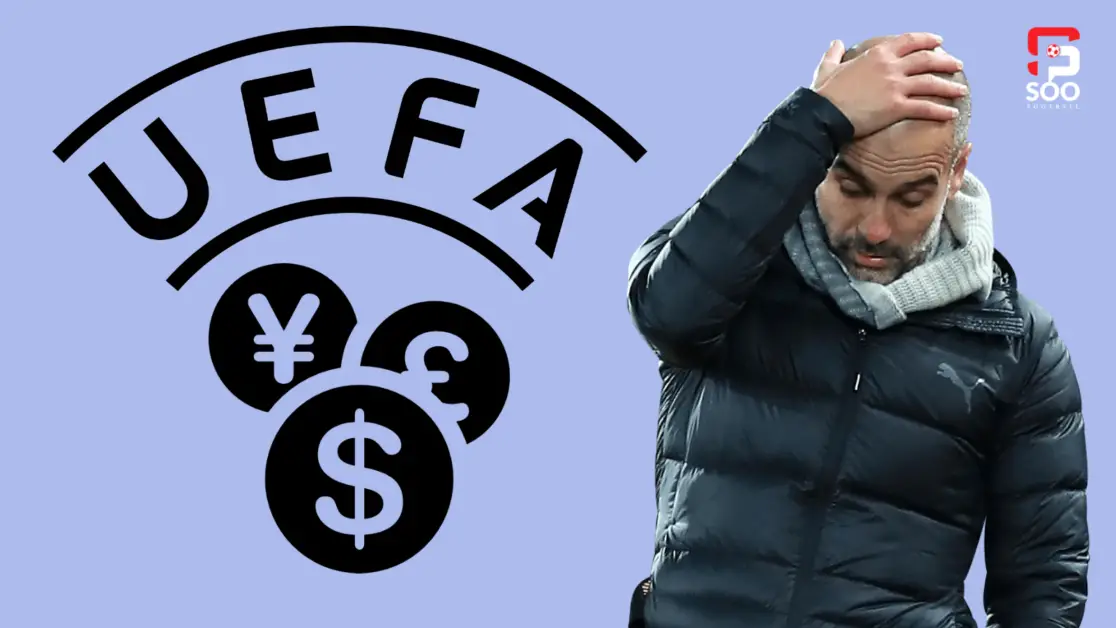Financial Fair Play is a common term in football but in truth, not every football fan understands what it means.
The talk about Financial Fair Play rules comes up often because clubs like Manchester City and PSG are accused of breaking the FFP rule.
Recently, Valencia coach wondered how Barca were able to afford Ferran Torres (for €55 M) and their plan to sign Halaan without breaking the FFP rule despite Barca’s current debt status.
In 2014, both Manchester City and PSG were fined €60 million, got their squad reduced to 21 players for UEFA competitions, their transfers spending and squad salary were severely restricted.
These types of stories are common. So, it is necessary to ask the question again – what is financial fair play in football?
Read Also: Why Footballers are Having Heart Issues.
What is Financial Fair Play In Football?
Simply put, without boring you with unnecessary details, Financial Fair Play Rule football governs football clubs such that they do not spend more than they make.
In addition, the FFP rule also ensures that football clubs balance their books, manage their losses and debts within a specific timeframe, and pay up important expenses (like players’ salaries.)
Also, it must also be mentioned that the FFP rule was initiated by UEFA (not FIFA.)
Read Also: VAR in Football: The Definitive Review and Recommendations
Why UEFA Initiated the FFP Rule in Football
UEFA believes that they are “protecting the game” by implementing the Financial Fair Play rule in football. How?
There were “serious and worsening financial conditions in European club football“. So, in a bid to make the situation better, UEFA initiated the Financial Fairplay Rule.
Consider Reading: Champions League Winning Managers who got hired mid-season
List of Clubs Punished By UEFA For Breaking FFP Rule
| SN | Club | Origin Nation | Punishment | Date |
|---|---|---|---|---|
| 1 | Vojvodina | Serbia | fined €10,000 | December 21, 2012 |
| 2 | Arsenal Kyiv | Ukraine | fined €45,000 | December 21, 2012 |
| 3 | Osijek | Croatia | fined €100,000 | December 21, 2012 |
| 4 | Dinamo București | Romania | fined €100,000 | December 21, 2012 |
| 5 | Rapid București | Romania | fined €100,000. They were handed a one-season ban from European competition | December 21, 2012 |
| 6 | Hajduk Split | Croatia | fined €40,000 | December 21, 2012 |
| 7 | Malaga | Spain | fined €300,000 and handed a one-season ban from European competition | March 31, 2013 |
| 8 | Astra Ploiești | Romania | withheld prize money for not paying outstanding payments | September 20, 2013 |
| 9 | Metalurh Donetsk | Ukraine | Handed a one-season ban from European competition and fined €80,000 | December 20, 2013 |
| 10 | Skonto | Latvia | Handed a one-season ban from European competition and fined €40,000 | December 20, 2013 |
| 11 | Trabzonspor | Turkey | withheld prize money for not paying outstanding payments | September 20, 2013 |
| 12 | Zrinjski Mostar | Bosnia and Herzegovina | withheld prize money for not paying outstanding payments | September 20, 2013 |
| 13 | Petrolul Ploiești | Romania | handed a one-season ban from European competition and fined €50,000 | December 20, 2013 |
| 14 | Pandurii Târgu Jiu | Romania | fined €40,000 | December 20, 2013 |
| 15 | Śląsk Wrocław | Poland | fined €20,000 | December 20, 2013 |
| 16 | Anzhi Makhachkala | Russia | fined €2 million, of which €1 million was suspended. Squad for UEFA competitions reduced to 21 players, and one-year squad salary restrictions imposed | May 16, 2014 |
| 17 | Bursaspor | Turkey | fined €200,000 fine, and one-year squad salary restrictions imposed | May 16, 2014 |
| 18 | Galatasaray | Turkey | fined €200,000, and one-year squad salary restrictions imposed | May 16, 2014 |
| 19 | Levski Sofia | Bulgaria | fined €200,000, and one-year squad salary restrictions imposed | May 16, 2014 |
| 20 | Rubin Kazan | Russia | fined €6 million, of which €3 million was suspended. Squad for UEFA competitions reduced to 21 players, and transfer spending restrictions and two-year squad salary restrictions imposed | May 16, 2014 |
| 21 | Trabzonspor | Turkey | fined €200,000, and one-year squad salary restrictions imposed | May 16, 2014 |
| 22 | Zenit Saint Petersburg | Russia | fined €12 million fine, of which €6 million was suspended. Squad for UEFA competitions reduced to 22 players, and transfer spending restrictions and two-year squad salary restrictions were imposed | May 16, 2014 |
| 23 | Paris Saint-Germain | France | find €60 million, of which €40 million was suspended. Squad for UEFA competitions reduced to 21 players, and transfer spending restrictions and two-year squad salary restrictions imposed | May 16, 2014 |
| 24 | Manchester City | England | fined €60 million, of which €40 million was suspended. Squad for UEFA competitions reduced to 21 players, and transfer spending restrictions and two-year squad salary restrictions imposed | May 16, 2014 |
| 25 | Astana | Kazakhstan | fined €2 million, of which €1.5 million was suspended. Squad for UEFA competitions reduced to 22 players, and transfer spending restrictions were imposed. Required to break even by 2018 | May 20, 2016 |
| 26 | Dinamo Zagreb | Croatia | fined €200,000. Squad for UEFA competitions reduced to 23 players and required to break even by 2016 | May 20, 2016 |
| 27 | Fenerbahçe | Turkey | fined €7.5 million, of which €5.5 million was suspended. Squad for UEFA competitions reduced to 22 players. Transfer spending restrictions imposed, required to reach a defined employee benefit expenses to revenue ratio, and required to break even by 2019 | May 20, 2016 |
| 28 | Trabzonspor | Turkey | fined €2 million, of which €1 million was suspended. Squad for UEFA competitions reduced to 22 players. Transfer spending restrictions imposed, required to reach a defined employee benefit expenses to revenue ratio, and required to break even by 2018 | May 20, 2016 |
| 29 | AC Milan | Italy | banned from European competitions for a year | June 28, 2019 |
Value of FFP Rule in Football
In truth, the FFP rule has helped football in many ways. Let us highlight some of them.
- Without the FFP rule, clubs can afford to go into debt uncontrollably.
- In reality, football clubs that truly comply with the FFp rules look more “financially responsible” than others.
- Ideally, there should be economic and financial stability among clubs that follow the FFP rules.
- Clubs are forced to operate within how much they make.
- Lenders are protected because the FFP rule ensures that football clubs pay their debts.
Read Also: Top Players Who Never Won the Champions League Trophy
Criticism of The FFP Rule
Of course, the Financial Fair Play rule is not perfect. While the motive of inventing the rule itself is positive, many football clubs and experts have criticized the FFP rule.
- The Financial Fair Play Rule is accused of favoring only the rich clubs while smaller clubs are not protected by the rule.
- As we’ve seen in the table above, most of the clubs punished for the FFP rule are small clubs.
- Club owners now try to outsmart the rules by manipulating their books just to pass the “FFP test”.
Further Reading:





